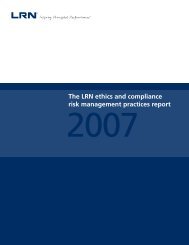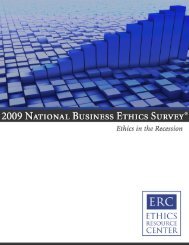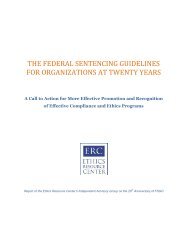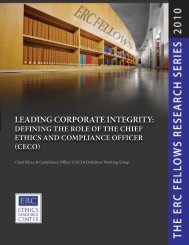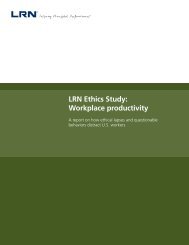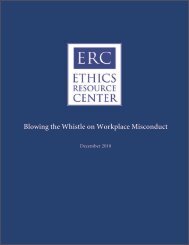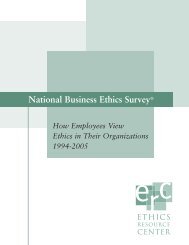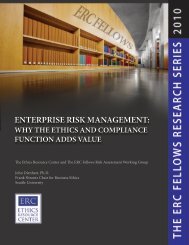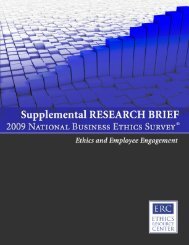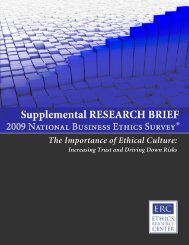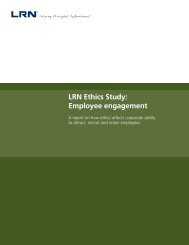PROCEDURAL JUSTICE - Ethics Resource Center
PROCEDURAL JUSTICE - Ethics Resource Center
PROCEDURAL JUSTICE - Ethics Resource Center
Create successful ePaper yourself
Turn your PDF publications into a flip-book with our unique Google optimized e-Paper software.
Encouraging Employee Reporting Through<br />
<strong>PROCEDURAL</strong> <strong>JUSTICE</strong><br />
DOES <strong>PROCEDURAL</strong> <strong>JUSTICE</strong> MAKE A DIFFERENCE<br />
IN ACCEPTANCE<br />
To determine the impact of the procedures, we used regression analysis to compare the relative influence of outcome<br />
favorability and perceived procedural justice on the way reporters evaluated the process (see Table 1). Surprisingly,<br />
whether or not their complaint was substantiated by the investigators had little impact on reporter perceptions of the<br />
process. On the other hand, and not surprisingly, complainants were much more likely to accept outcomes they thought<br />
were favorable. 9<br />
Significantly, the primary factor influencing the degree of acceptance was whether or not reporters felt the procedure used<br />
to handle their report was fair. Broken down further, reporters indicated that the quality of decision-making was slightly<br />
more important to acceptance than the quality of the personal treatment they received, but that positive perceptions of<br />
both of those elements contributed to acceptance. The regression equation shown in Table 1 indicates that procedural<br />
justice was central to acceptance (beta = 0.49); while perceived outcome favorability played a secondary role (beta = 0.35).<br />
The crucial management issue is whether those dealing with reports can rely on fair procedures to help resolve conflicts<br />
and address the issues that underlie employee reports. Our analysis suggests that the answer is “yes.” Over and above<br />
reporters’ reactions to the outcomes of the process, experiencing fair report management makes it more likely they will<br />
willingly accept investigators’ decisions.<br />
That’s particularly impressive when one considers that most people who report a problem or grievance begin the process<br />
with some dissatisfaction about events in the workplace and might be predisposed to be unhappy about outcomes,<br />
especially when they do not like the final resolution.<br />
9. The correlation between the objective and perceived outcome was r=0.19.<br />
15




